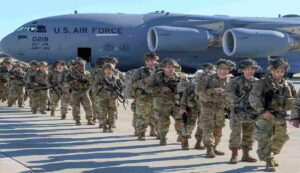US increases troops in Middle East after Donald Trump threatens to bomb Iran
US: Following President Donald Trump’s warning to strike Iran if it does not reach a new agreement on its nuclear program, the United States is sending additional troops to the Middle East.

The U.S. Department of Defense’s declaration that it is sending more troops to the Middle East is a sign of the escalating tensions and the potential for preparations for an attack on Iran’s nuclear program.
Iran has rejected direct discussions while it is under Trump’s “maximum pressure” campaign, despite Trump’s declaration that he would prefer conversations. Part of the military buildup may be posturing, but it might also be strike preparations.
It also backs ongoing U.S. airstrikes against Iran-backed Houthi rebels in Yemen, who have been attacked by American troops for more than two weeks without ceasing their own attacks.
Defense Secretary Pete Hegseth ordered the Carl Vinson Carrier Strike Group to join the Harry S. Truman Carrier Strike Group in the U.S. Central Command (CENTCOM) area of responsibility, according to Chief Pentagon Spokesman Sean Parnell.
“To complement the CENTCOM maritime posture, the Secretary also ordered the deployment of additional squadrons and other air assets that will further reinforce our defensive air-support capabilities,” he said.
“Should Iran or its proxies threaten American personnel and interests in the region, the United States will take decisive action to defend our people.”
Since Trump withdrew from the 2015 international nuclear deal, tensions between the United States and Iran have increased, escalating a protracted confrontation. Tehran has escalated its rhetoric in response to his reintroduced war threats and the reintroduction of “maximum pressure” sanctions.
Iran has avoided direct talks, stating that it would not engage under Trump’s pressure, but it is still open to indirect discussions, despite the U.S.’s stated desire to negotiate a new agreement.
Israel, a U.S. ally, has also said that military action against Iran is feasible and that it cannot tolerate Iran obtaining nuclear weapons, which it claims it is not seeking.
A senior Iranian military officer has warned that if the United States launches a military campaign against Iran, American personnel in the Middle East would face reprisals. A strike on Iran would have “catastrophic” repercussions, according to Russia, “especially if the nuclear infrastructure is hit.”
Sean Parnell, the chief Pentagon spokesman: “The United States and its partners remain committed to regional security in the CENTCOM AOR and are prepared to respond to any state or non-state actor seeking to broaden or escalate conflict in the region.”
Amir Ali Hajizadeh, head of the Iranian Revolutionary Guard Corps Aerospace Unit: “The Americans have around 50,000 soldiers and 10 military bases in the area, at least close to Iran. They seem to be seated in a glass home. Additionally, you don’t hurl stones at people while you’re in a glass home.
“This escalating rhetoric may trap them both in a war that neither side wants unless realistic bargaining positions are adopted by both sides and a discarding of maximalist approaches,” said Trita Parsi, Executive Vice President of the Quincy Institute for Responsible Statecraft.
Although negotiation has not been ruled out as a solution to the deadlock over Iran’s nuclear program, the likelihood of an attack against Iran is growing, and the regional military buildup is likely to continue.